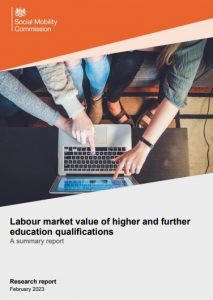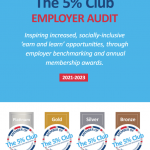Social Mobility Commission calls for central information hub
on labour market returns for HE and FE

A new report out today shows a wide variation in how different higher education and further education courses improve earnings. The research review from the Social Mobility Commission shows that vocational and technical courses at FE colleges can boost young people’s earnings. But it also reveals that some university courses fail to increase potential salaries, particularly those at less selective universities that are more likely to be chosen by students from poorer backgrounds.
The report highlights IFS research that shows how some students who complete a degree have lower earnings than other similar students who did not go to university. This raises questions over whether they would have earned more had they studied in FE instead.
Labour market returns on higher and further education qualifications confirms that courses at selective universities, such as those in the Russell Group, tend to give the biggest boost to students’ earning potential. But these universities continue to admit fewer students from state schools and under-represented areas than benchmarks based on the grades required to get in – doing little to help social mobility.
The IFS has previously shown that at the least selective universities, 20% to 30% of students were eligible for Free School Meals at age 16. But this falls to below 2% on average in the 10 most selective universities.
“Many of the more selective universities are top performers for boosting earnings, but worst offenders for providing access to students from low socio-economic backgrounds (SEB),” said Alun Francis, SMC interim chair. “To improve social mobility, we need these universities to do even more to improve access.”
The review also shows that many courses at less selective universities seem to add little labour market value but students from low SEBs are over represented here. “We need to ensure prospective students are aware of the earnings implications of all their HE and FE options, so they can make an informed choice, before applying,” said Mr Francis.
The SMC is investigating the creation of a central information hub combining information about the labour market returns for HE and FE qualifications, the availability of contextualised offers and financial support from different institutions.
Many reviews have been carried out on the value of university courses but there has been much less research published on FE. The SMC report shows that on average, studying a qualification in either HE or FE leads to higher future earnings. The majority of courses also provide positive ‘value-add’ – the difference in future earnings which can be directly associated with the qualification, rather than any other personal factors.
The information on FE courses shows some evidence that there are good earnings returns on engineering courses for men and business, administration and law for women. But there is little data about individual colleges.
A separate survey of 1,487 students carried out by the Commission late last year showed that 25% of sixth formers considering a degree did not know that data about the typical salaries for people graduating from the course and institution they were interested in was available. But they said this information would be an important factor in their decision. This rises to a third of students considering vocational or technical qualifications.
The SMC will be holding an event on 28th February to bring stakeholders in education, careers advice and social mobility to start addressing this information gap, particularly for disadvantaged people.
See the full report and summary.




